Massachusetts Divorce Process
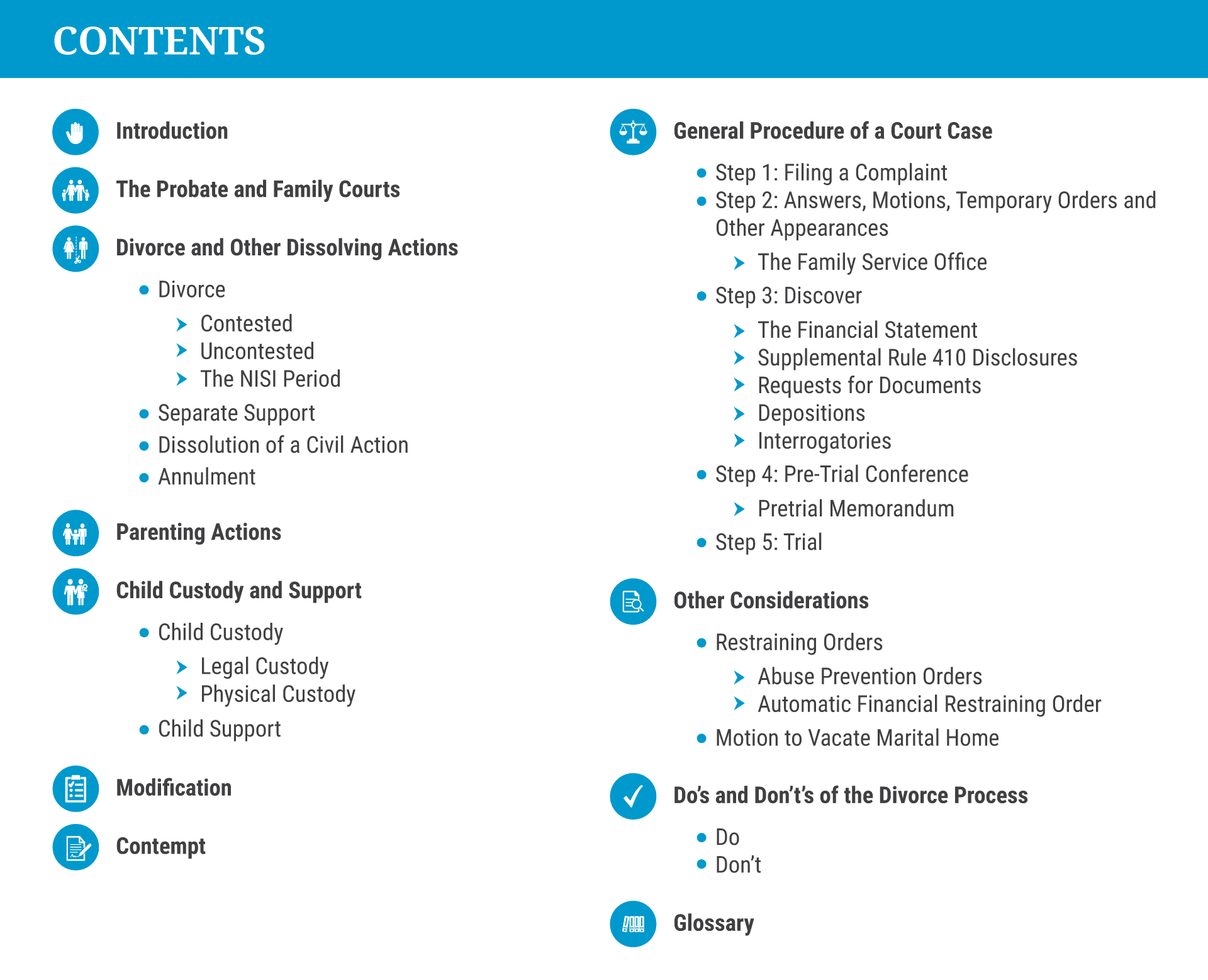
CONTENTS
- Introduction
- The Probate and Family Courts
- Divorce and Other Dissolving Actions
- Divorce
- Contested
- Uncontested
- The NISI Period
- Separate Support
- Dissolution of a Civil Action
- Annulment
- Parenting Actions
- Child Custody and Support
- Child Custody
- Legal Custody
- Physical Custody
- Child Support
- Modification
- Contempt
- General Procedure of a Court Case
- Step 1: Filing a Complaint
- Step 2: Answers, Motions, Temporary Orders and Other Appearances
- The Family Service Office
- Step 3: Discover
- The Financial Statement
- Supplemental Rule 410 Disclosures
- Requests for Documents
- Depositions
- Interrogatories
- Step 4: Pre-Trial Conference
- Pretrial Memorandum
- Step 5: Trial
- Other Considerations
- Restraining Orders
- Abuse Prevention Orders
- Automatic Financial Restraining Order
- Motion to Vacate Marital Home
- Do’s and Don’t’s of the Divorce Process
- Do
- Don’t
- Glossary
INTRODUCTION
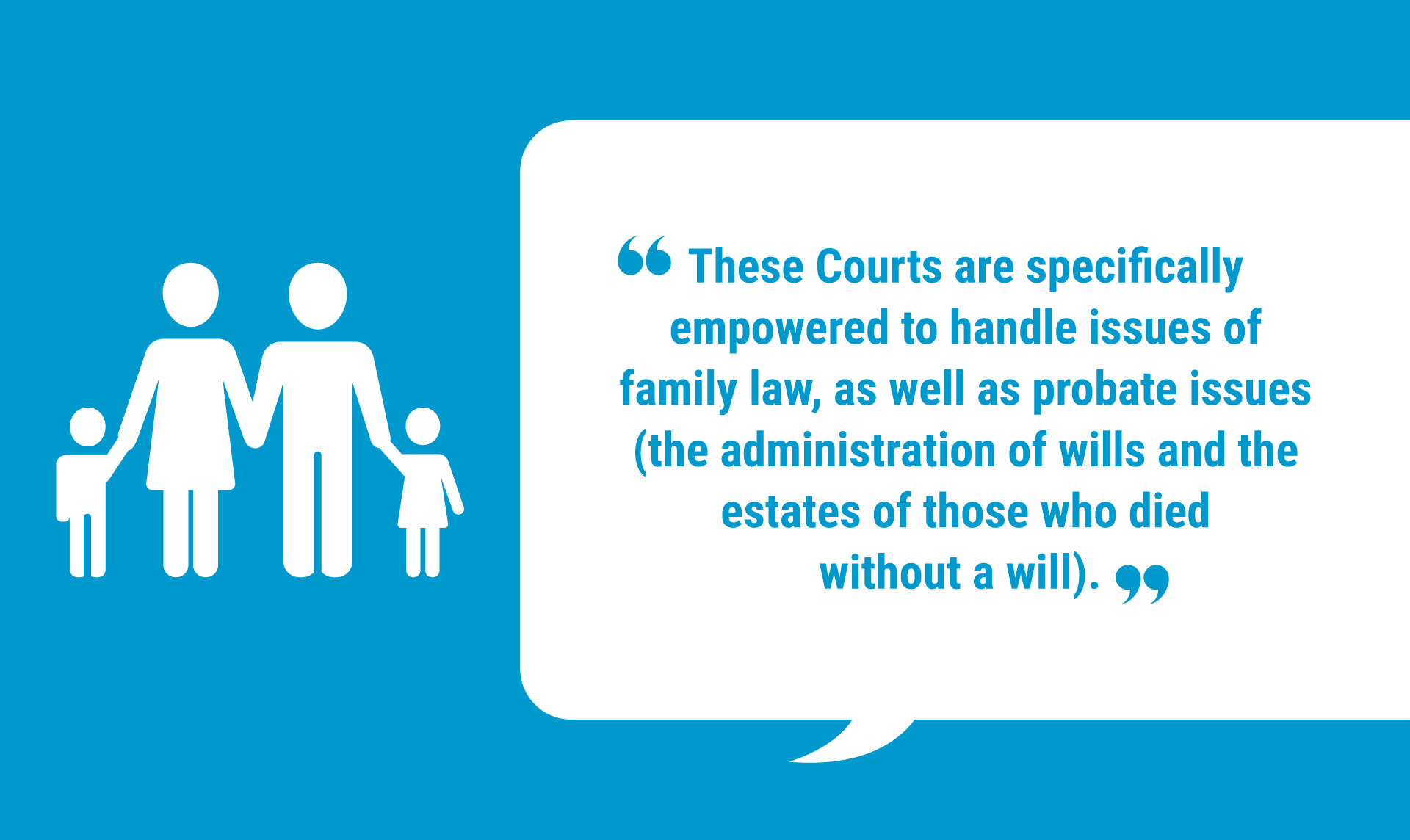
The Probate and Family Courts are a specific subdivision of the Massachusetts Courts. These courts are specifically empowered to handle issues of family law, as well as probate issues (the administration of wills and the estates of those who died without a will). While these courts handle issues in both areas, the vast majority of the cases they handle deal with issues of family law. This means that the judges of both Probate and Family Courts are experts at handling these relevant issues.
Over the years, we’ve found that many of our clients ask the same or similar questions about their legal rights and the legal process of their divorce proceedings and family law matters. An equal number of clients are so overwhelmed by the entirety of their circumstances that they haven’t had the time or the energy to fully consider these Massachusetts law questions. As a result, we have created this page in order to assist you in understanding the process of litigating in the Probate and Family Courts, your basic rights, and some “Dos and Don’ts” that will help the process move along as quickly as possible and with minimal disruption to your life.
We also recommend that our clients consult this page throughout their divorce case, as it has been authored for the sole purpose of answering the questions our clients most frequently ask. It will provide you with all the basic information you’ll need during the course of your divorce proceedings, as well as offer jumping-off points for asking questions that are specific to your family court case.
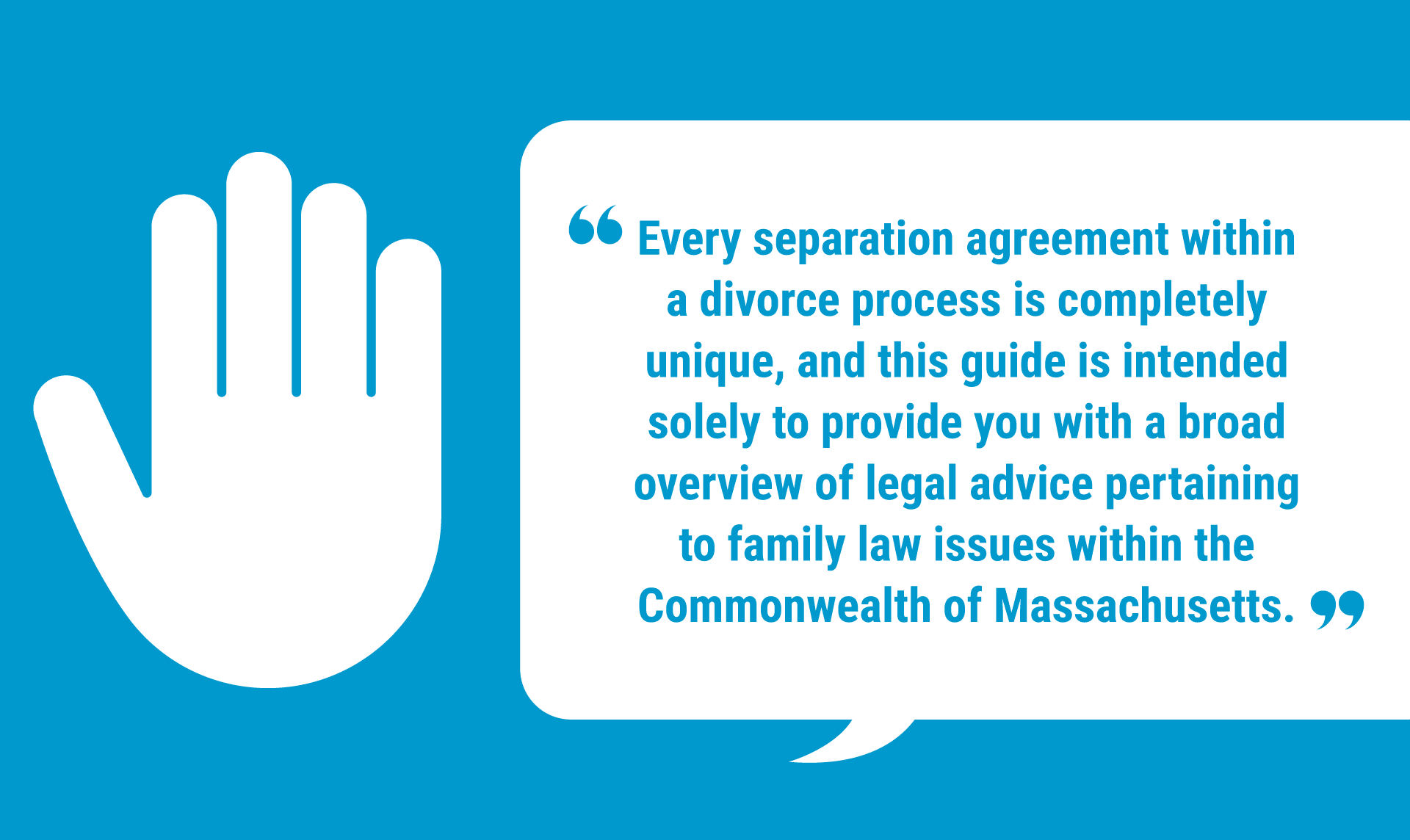
The information contained within these pages is not a substitute for individual legal advice from a licensed divorce law attorney specializing in Massachusetts Law and isn’t compliant with the privileges of an established attorney-client relationship. Every separation agreement within a divorce process is completely unique, and this guide is intended solely to provide you with a broad overview of legal advice pertaining to family law issues within the Commonwealth of Massachusetts.
All of us at Infinity Law Group understand that your family is unique, and we aim only to empower you to make informed decisions for yourself and your family. We’ve helped countless couples obtain final divorce settlements that were favorable for all involved parties, including settlements in the best interests of the child or minor children.
Contact us today for a free consultation so we can review the details pertaining to your separation agreement and begin the necessary first steps towards your divorce case’s most favorable outcome.
THE PROBATE AND FAMILY COURTS
The Probate and Family Courts are a specific subdivision of the Massachusetts Trial Courts. These Courts are specifically empowered to handle issues of family law, as well as probate issues (the administration of wills and the estates of those who died without a will).
While these Courts handle issues in both areas, the vast majority of the cases they handle deal with issues of family law. This means that the judges of the Probate and Family Court are quite expert at handling the relevant issues.
Further, one particular judge will become the expert on your case. Once your case is filed with the appropriate branch of the Probate and Family Courts, as dictated by the county in which you and/or the opposing party live, it will be assigned to a specific judge.
This judge will preside over your case as long as he or she continues to sit in the branch of the Probate and Family Courts with jurisdiction over your matter, barring extenuating circumstances.
DIVORCE AND OTHER DISSOLVING ACTIONS
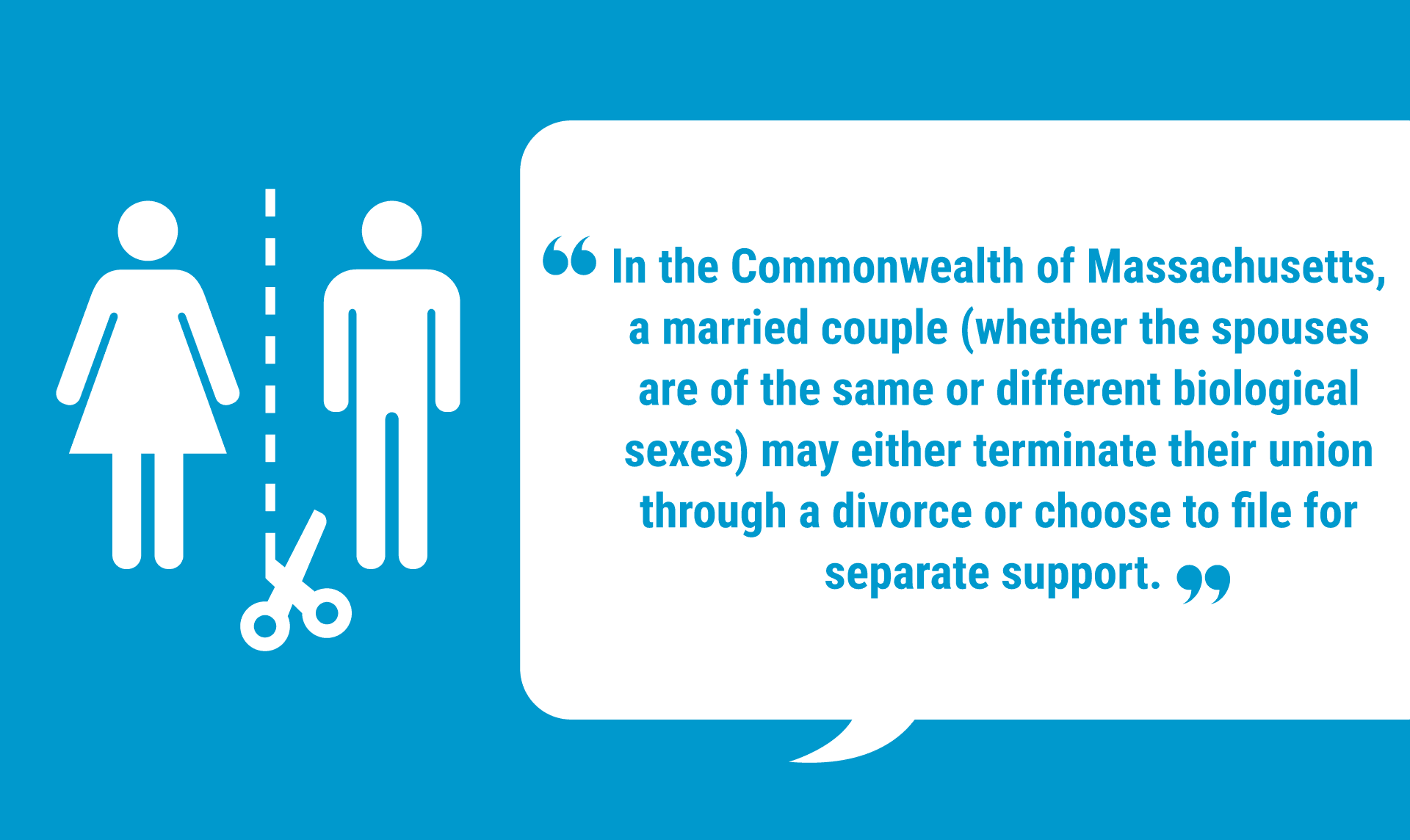
In the Commonwealth of Massachusetts, a married couple (whether the spouses are of the same or different biological sexes) may either terminate their union through a divorce or choose to file for separate support.
The latter of these options, separate support, is essentially an action for “legal separation” (see below section on Separate Support). Additionally, the Commonwealth allows a marriage to be annulled under certain circumstances and offers legal recognition of Civil Unions as well as their dissolution. In any of these cases, you are asking the Court to decide you and your spouse’s rights and duties now that you have decided to end your personal romantic relationship.
DIVORCE
A divorce terminates a legal marriage. Once two In Massachusetts, all of both spouses’ assets must be addressed in a divorce, no matter when or how acquired. Additionally, these assets are not simply split half and half but are divided fairly considering all of the relevant factors. People are absolutely divorced (see “The Nisi Period” section below), they are legally recognized as “single” and may enjoy all the rights and obligations that come with that status, including the right to marry a new individual. During the process of a divorce, a number of issues must be decided. Namely, you and your spouse (or the Court, if you cannot agree) must decide:
- How you will handle property division, particularly the assets and liabilities held by both you and your spouse (marital property)
- Whether or not alimony/spousal support will be paid, and if so, how much and when
- Issues of child custody and child support guidelines
Some of the most common divorce law questions clients ask us to pertain to property division. The first question is which assets are eligible for division, and are essentially considered marital property. The answer to this question is any and everything you and your spouse own, whether jointly or individually, no matter when they were acquired.
Though popular culture has taught us to apply the idea that the concept of “yours, mine, and ours” when deciding what is or is not involved in your divorce proceeding, Massachusetts law does not embrace this idea. Whether you purchased it on your own ten years before the marriage, or it was a wedding gift, it is “in the pot” of marital property, so to speak.
The second question is how the property division should occur. Again, popular culture has taught us the idea of the “50-50” divorce. Again, the Massachusetts court system does not follow this popular wisdom.
Massachusetts is an “equitable division” state, and “equitable division” essentially means that the property should be divided fairly, based upon all relevant circumstances. Maybe you and your spouse had a traditional marriage whereby one person was the primary breadwinner and one person was the primary homemaker. Massachusetts views both of these contributions as valuable and considers both when dividing property acquired during the marriage. It’s important to understand that divorce hearings aren’t an instant process and that it takes time to move from beginning filing fees of the divorce decree to the ending final divorce settlement.
Maybe both you and your spouse were independently successful prior to your marriage and each own property independent of one another. While these properties would still need to be addressed in any divorce proceedings or judgment, how they were acquired is relevant to which spouse will ultimately get to keep them.
Other questions we are commonly asked deal with the nuts and bolts of divorce, including the different types of divorce, and the more intricate details of the divorce process. While much of this information is contained in the below “General Procedures of a Case” section, it’s important to know a few things that are specific to every divorce case.
First, you should note that divorce proceeding is not an instant process and that it takes time to move from beginning to end. In order to facilitate quick movement after a divorce complaint is officially filed, the Court has instituted what is known as track assignments.
Track assignments offer suggestions as to how long a divorce proceeding should take based upon the family law issues involved, and they also provide specific deadlines for certain landmarks within your case, like filing fee payment requirements and financial statement filings. Divorces are assigned to either nine or fourteen-month tracks. This is based upon how long the average divorce proceeding takes to be resolved. Your case may move more quickly or more slowly, but you should expect that your own case will take between nine and fourteen months to completely resolve itself.
Next, you should understand that the Commonwealth of Massachusetts allows for two different types of divorce, contested and uncontested.
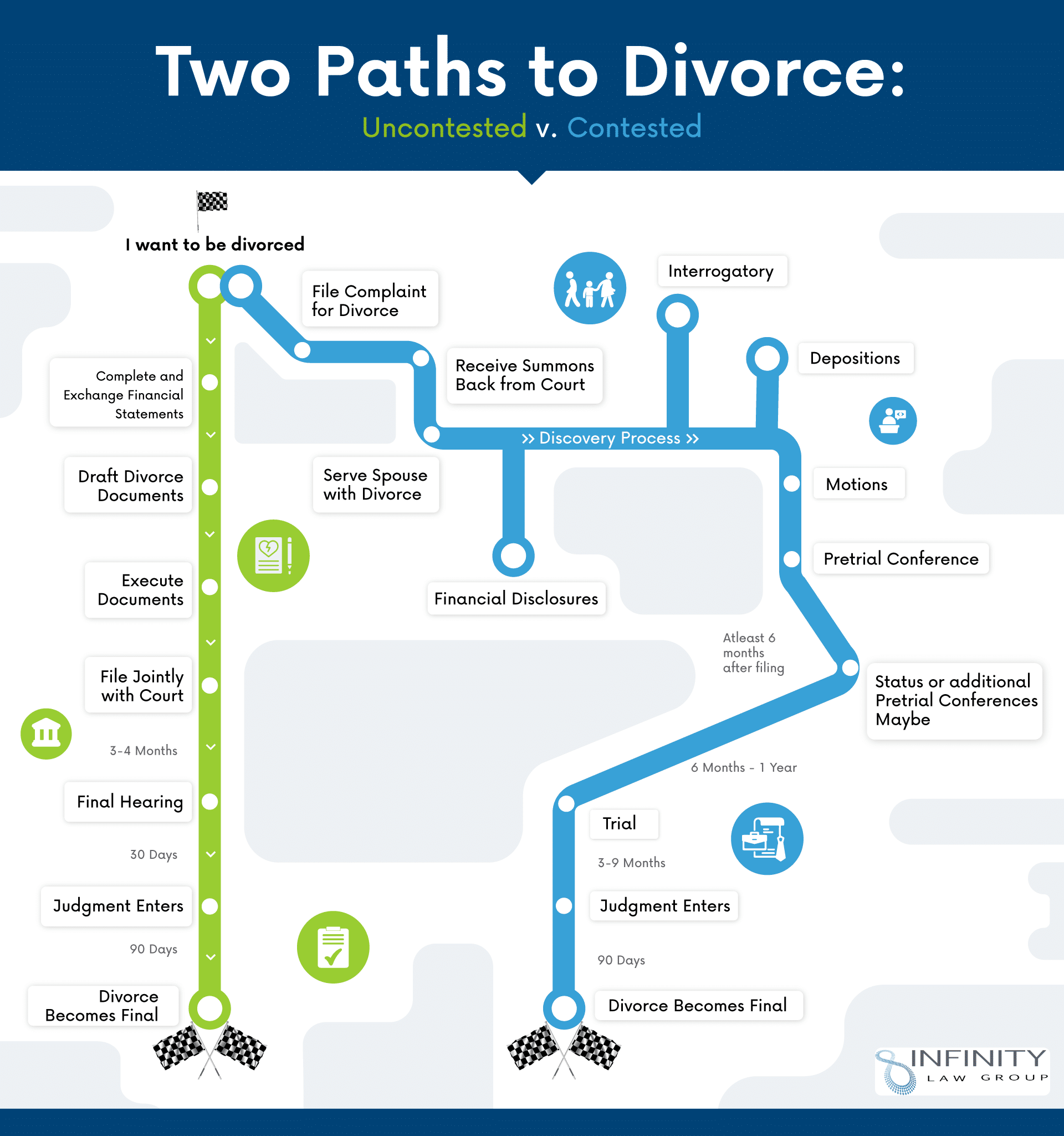
CONTESTED
A contested divorce is filed by one party (the Plaintiff) A divorce is considered contested when the spouses cannot come to full agreement, even if it is only one out of a myriad of issues that must be settled during the process “against” the other party (the Defendant). This type of divorce is filed when spouses are unable or unwilling to come to an agreement as to how to settle all of the relevant issues, which is sometimes referred to as an irretrievable breakdown of the marriage.
Massachusetts does not recognize the concept of “legal separation”, but does allow the Courts to enter judgments that require the payment of spousal support or child support and establish a parenting plan.
There are some rare cases when one spouse is interested in what most people would call “fault grounds” (rather than “no-fault”) divorce. In these types of divorce proceedings and division of assets disagreements, the Defendant must be served with a Complaint (see the “General Procedures” section), which they then answer. The case proceeds as contested litigation.
Filing a contested divorce does not automatically mean that the case will have to go to trial before a judge because divorce processes rarely actually end with a trial. Instead, the parties may continue to negotiate outside of the courtroom, and more often than not eventually reach a final divorce agreement in the form of a Separation Agreement.
UNCONTESTED
An uncontested divorce is filed when both spouses agree on all relevant issues, and this commonly comes in the form of a joint petition for divorce.
Rather than one party filing a divorce complaint which the other must answer, the parties file a complete agreement with the Court and merely ask that the Court grant them a divorce under the terms they have already agreed to. Uncontested divorces are always filed on the grounds of “irretrievable breakdown”, more commonly known as a no-fault divorce.
THE NISI PERIOD
The NISI (pronounced “nice-eye”) Period is a waiting period of time between the date that the Court issues the Judgment and when the Judgment has a legal effect on when the parties are “absolutely divorced”. The NISI Period lasts 90 days in a contested divorce and 120 days in an uncontested divorce.
It is a relic of an earlier age, put into place to provide divorcing spouses with one last chance to reconcile before their divorce is absolute, and the only way for their relationship to be legally recognized is for the parties to remarry. The NISI Period is automatically begun when the parties choose to annul their marriage because they are asking the Court to state that their marriage was never valid.
Unlike other dissolution actions, an annulment does not involve the division of assets or orders of spousal support, because if a marriage is annulled it never occurred. Therefore the parties do not have the right to have assets divided or orders of spousal support entered as in these other cases.
The Court will enter a Judgment of Divorce NISI, typically within thirty days of your final hearing date or the last day of a trial. The NISI Period also automatically expires, giving rise to a Judgment of Divorce Absolute. The NISI Period lasts 90 days in the case of contested divorces and 120 days in the case of uncontested divorces.
SEPARATE SUPPORT
People commonly call our office looking for information about how to become “legally separated” from their spouse. Massachusetts law does not recognize the concept of “legal separation”, but does allow the Courts to enter judgments that require the payment of spousal or child support and establish a parenting plan even when two spouses are not yet ready to actually divorce.
This is known as a Separate Support action. Separate Support Actions do not split along contested or uncontested lines as with divorce. One Spouse must always file “against” the other spouse, although, as with contested divorce, they may reach a full agreement outside of the courtroom and resolve the matter on their own terms rather than going to trial.
DISSOLUTION OF A CIVIL UNION
The Commonwealth of Massachusetts does not grant Civil Unions. It does, however, offer legal recognition to Civil Unions that were granted in other jurisdictions. Given this fact, Massachusetts has also had to come up with a means by which a Civil Union may be terminated. This solution is an action to dissolve a Civil Union.
The process of obtaining the dissolution of a Civil Union is similar to that of obtaining a divorce. Instead of filing a petition or complaint for divorce, though, what is filed is an “equitable complaint”. This asks the Court to dissolve a Civil Union because it is an appropriate action given the Court’s jurisdiction over family matters, and because it is in the interest of justice for the Court to allow those with a Civil Union to terminate this legal union.
Due to the nature of this action, there is no option to file an “uncontested” complaint. This does not mean, however, that the parties are barred from reaching agreement on their own. As with a contested divorce, parties to an equitable complaint to dissolve a Civil Union may reach a full agreement outside of the courtroom.
ANNULMENT
Annulment is only available in a very limited set of circumstances. When parties choose to annul their marriage, they are asking the Court to state that their marriage was never valid. Unlike other dissolution actions, an annulment does not involve the division of assets or orders of spousal support, because if a marriage is annulled it never occurred and therefore the parties do not have the right to have assets divided or orders of support entered as in these other cases.
Annulment is only available in a very limited set of circumstances. These circumstances are:
- Where the parties are too closely related (either by blood or by law).
- One or both of the parties was already legally married, and therefore committed bigamy when she or he entered into the marriage.
- One or both of the parties lacked the mental capacity to enter a marriage, whether due to mental illness, intoxication, or being under the age of 18 at the time she or he entered the marriage.
- One of the parties perpetrated a fraud “going to the essence of the marriage contract”. This would require one party to have lied about something key to the validity of the marriage, such as the reasons he or she entered into the marriage (e.g. he or she solely married the other for immigration purposes without telling his or her spouse).
These are the only circumstances under which parties may be granted an annulment.
PATERNITY ACTIONS
A paternity action asks the Court to recognize that an individual is the parent of a child who was born outside of wedlock. In Massachusetts, a child is considered to be born within marriage if the child is born either during a marriage or within Massachusetts.
A man is presumed to be a child’s father if he was married to the child’s mother at the time of the child’s birth, or the child was born within 300 days of the termination of that marriage by death, annulment, or divorce, or 300 days of a marriage’s termination by death, annulment, or divorce. This is a presumption which may be overcome if you are attempting to establish someone other than your current or former spouse as your child’s parent.
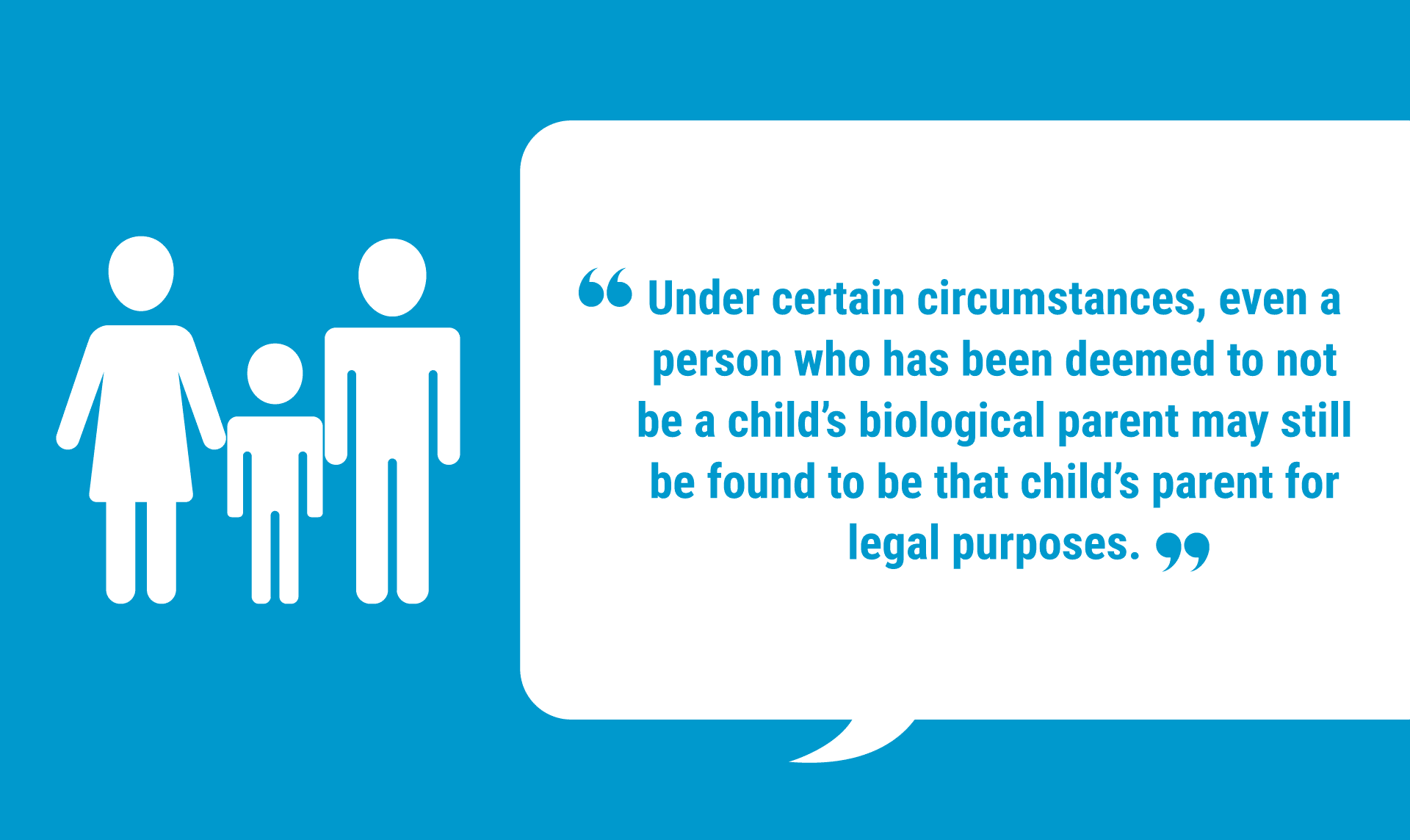
It should be noted, however, that whether or not one may be held responsible as a child’s parent does not turn on mere biology. Under certain circumstances, even a person who has been deemed to not be a child’s biological parent may still be found to be that child’s parent for legal purposes.
Paternity actions may be filed by either a mother seeking to force a father to acknowledge that he is a child’s parent or by a father seeking to force a mother to recognize that he is a child’s parent. Paternity actions are not the appropriate course of action when both parents have already voluntarily acknowledged their parentage.
Though parties may seek a judgment that establishes an obligation to pay child support and one that outlines the parents’ custodial rights along with a parenting plan through a paternity action, if both parents have already acknowledged their parentage (through signing a birth certificate or a previous paternity action), the appropriate way to establish or modify the parents’ obligations and rights is through either a Complaint for Modification or a Complaint for Child Custody and Support.
CHILD CUSTODY AND SUPPORT
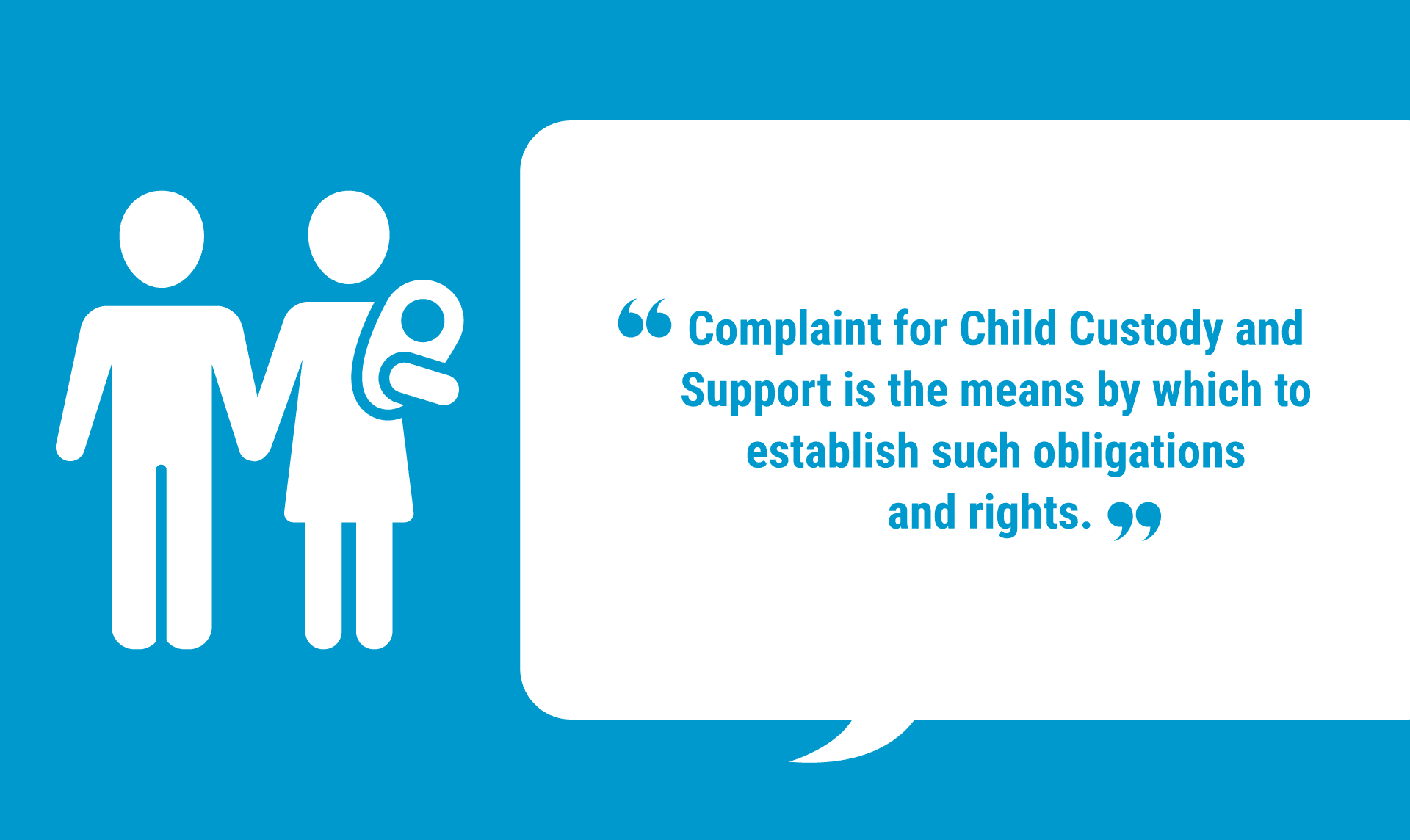
Actions for child custody and child support are appropriate when you and your child’s other parent were never married but have both acknowledged that the other is the child’s parent. If you and your child’s other parent have never made a formal agreement regarding your custodial rights, your obligations to financially support your child, and a parenting plan, a Complaint for Child Custody and Support is the means by which to establish such obligations and rights.
In the Commonwealth of Massachusetts, a parent’s gender is not relevant to his or her custodial rights, obligations to provide financial support, or the rights to have a meaningful relationship with his or her child.
While there are certain cultural norms that have led American courts to award primary physical custody to mothers, these are in no way codified in the law. Fathers can and are awarded primary custody where it is in “the best interest of the child”.
It should be noted that the Commonwealth, as with divorces, provides track assignments in order to facilitate the quick movement of child custody and support actions. In the case of child custody and support actions, there is a six-month track assignment to reflect the average length of these cases. As with divorces, this is an average, so your case may move more quickly or slowly depending on the issues involved.
CHILD CUSTODY
Determinations of child custody are made on the basis of “the best interest of the child”. This standard allows judges of the Probate and Family Courts to consider the totality of the circumstances surrounding the child.
Though the Court can and does consider a wide variety of factors, some of the more relevant include how stable the arrangement will be, the ability of each parent to consider the best interests of his or her child when making decisions, and whether or not the parents are capable with co-parenting.
For example, the Court is unlikely to side with a parent who wants to uproot their child from a place where they have lived for most or all of their life if it is possible to avoid such disruption and there is no serious concern to justify the disruption. Often, when parents cannot agree on issues of child custody, we recommend that they retain the services of a Guardian Ad Litem (GAL).
A GAL is an attorney, and in some cases, also a mental health professional, who serves as a neutral observer. A GAL will speak with the parents, the children, and other key persons in a child’s life (teachers, medical and mental health professionals, and members of the child’s extended family who are involved in their day-to-day lives, for example) to assess what is actually going on.
This information is then used in the creation of a factual report that is reviewed by the judge. These reports may, upon a judge’s request, also contain recommendations about what the judge should decide.
Custody is actually composed of two parts, physical custody and legal custody, both discussed in depth below. Even if you are delinquent in paying your child support, your right to make decisions about your child’s life and spend time with or communicate with your child remains intact.
It is important to remember that even a parent who doesn’t have physical custody of his or her child maintains the right to spend time with his or her child. Additionally, your right to enjoy legal and/or physical custody of your child is not dependent upon your ability to meet obligations to financially support your child.
Even if you are delinquent in paying your child support, your right to make decisions about your child’s life and spend time with or communicate with your child remains intact.
LEGAL CUSTODY
When most people consider the idea of child custody, they are contemplating who has physical custody of a child. While physical custody is one half of this equation, another important piece is who has legal custody of a child.
Legal custody is what gives a parent the right to make key decisions about a child’s upbringing, like where a child will attend school and whether or not a child will have a certain medical procedure. Legal custody is also what enables a parent to request information from a child’s school and doctors. In the vast majority of cases, parents are awarded joint legal custody.
Sometimes, one parent is awarded sole legal custody of a child. This tends to occur only where either the non-custodial parent is completely uninvolved in his or her child’s life or where the parents are incapable of co-parenting.
It is important to note that one parent being awarded sole legal custody is not the equivalent of terminating the non-custodial parents’ parental rights. A parent without legal custody can still be awarded parenting time with his or her child.
PHYSICAL CUSTODY
As stated above, when most people speak of custody, they are contemplating physical custody. Physical custody does not determine a parent’s right to make decisions about a child’s life, a parent’s obligation to financially support his or her child, or a parent’s right to have a meaningful relationship including spending time with his or her child. Physical custody only determines which parent a child will primarily reside with.
Physical custody may be awarded to only one parent, or the parents may be awarded joint physical custody. Unless the parents get along extremely well and live in very close proximity to one another, it is typical that one parent will have physical custody, and the other will enjoy parenting time.
This is because joint physical custody essentially means that a child splits his or her time equally between his or her parent’s homes.
It is unlikely to be in the best interests of the child to shuffle between two homes if his or her parents do not communicate well, or such movement separates him or her from his or her peers and creates a long commute to school each day.
PARENTING PLANS
A “good” parenting plan is one that is clear when it comes to each parent’s rights and obligations, and one that looks far into the future in order to avoid the need to change the agreement.
Historically, parenting plans were also known as “visitation schedules”. As these plans often involve much more than merely setting a schedule for who gets to see the child when, this term has been abandoned in favor of the more accurate term “parenting plan”.
A parenting plan is used to establish a schedule for when each parent will see their child (or in cases where the parents communicate well, how the parents will make decisions about sharing parenting time on an ongoing basis in lieu of having a set schedule).
In addition, a parenting plan may address issues like how parents will make decisions about a child’s mental and emotional health as well as his or her education, and how they will resolve differences when they disagree.
A “good” parenting plan is one that is clear when it comes to each parent’s rights and obligations, and one that looks far into the future in order to avoid the need to change the agreement.
If your child is currently very young, it is still a good idea to consider that your child will eventually begin attending school, and even further into the future, when he or she will become a young adult who is capable of making well-reasoned decisions.
It is unhealthy, for instance, to write an agreement that would require you or your child’s other parent to attempt to force a teenager to abide by a parenting plan that he or she fundamentally disagrees with.
PARENT EDUCATION PROGRAMS
The Commonwealth of Massachusetts requires divorcing parents to participate in Court approved parent education programs. These six-hour programs provide some insight into the challenges ahead and provide information on how to successfully co-parent despite the fact that you and your child’s other parent are no longer romantically involved.
Although these programs may be waived under a limited set of circumstances, it is rare that these circumstances actually occur. As such, we recommend that our clients enroll in and complete these courses early on in the process.
CHILD SUPPORT
In the Commonwealth of Massachusetts, all parents are responsible for financially supporting their children. The obligation to provide financial support for your child exists whether or not you have physical or legal custody, and even remains when your right to spend time with or have contact with your child has been suspended. Barring a termination of your parental rights, you are obligated to financially support your child.
The amount of child support owed from one parent to Barring a termination of your parental rights, you are obligated to financially support your child.another is determined by which parent the child primarily resides with and the gross weekly income of each parent. These factors are plugged into an official set of guidelines, which provide a specific weekly amount to be paid from one parent to another. It
should be noted that parents can mutually agree to a child support amount that is more or less than the amount recommended by the guidelines.
The guidelines provide a formula for determining the amount of child support owed. This formula provides a set base dollar amount plus a certain percentage of a parent’s weekly income. The set base dollar amount does not change once a parent’s income is in excess of $750/week (or $39,000 annually). It does, however, consider income by applying the percentage of a parent’s weekly income owed.
Even where parents have joint physical custody, child support is still considered. In these cases, guidelines are typically applied as though each parent is the primary custodian. This provides the amount of support each parent would be required to pay were he or she the primary custodian. The parent with the higher obligation is then required to pay the parent with the lower obligation the difference between the two figures.
Lastly, it should be clear that child support is not intended to satisfy all of your obligations regarding the support of your children. Child support is intended to cover basic financial needs, like providing housing, food, and clothing for your child. Other expenses, like health insurance coverage, the payment of uninsured medical expenses, payment for uninsured dental, mental health, or vision expenses, the cost of extracurricular activities or childcare, and educational expenses are not considered to be covered by your child support payment.
MODIFICATION
Issues where the law interacts with the inner‐workings of your family are unique. Unlike other areas of life, changes in the way your family lives are inevitable. Children grow up and leave home, people’s incomes change, and your relationship with your former spouse is likely to still have ups and downs. The Commonwealth recognizes this, and as such, allows for the modification of certain judgments from the Probate and Family Court.
The first thing that should be noted is what cannot be modified: divisions of property. If you have divorced, the division of your assets (your real estate, other property, and any other assets or liabilities) is final. You cannot modify this arrangement after the fact. If you are seeking to modify this part of a judgment, it is simply not an option.
Judgments regarding the custody and support of your children, your parenting plan, or spousal support obligations may be modified. Judgments regarding the division of assets made during a divorce may not be modified. With this note behind us, we may move on to what can be modified: any judgment or order pertaining to your children, including child support obligations, and spousal support obligations.
Judgments that fall within these categories may be modified when there has been a “significant change” in the “material circumstances”. While this standard is somewhat vague, it is intended to encourage individuals to consider all of the relevant and foreseeable circumstances when coming to an agreement, and to prevent them from using the Court to settle what are really minor or petty disagreements.

Though the standard itself does not say as much, there are certain things that aren’t significant changes in the material circumstances. For instance, it is unlikely that such a change will occur within a year of the judgment you are seeking to modify. An issue that was completely foreseeable that you failed to consider is not a significant change to a material circumstance.
Minor changes in your or the opposing party’s incomes are not significant changes to the material circumstances. Instead, significant changes to the material circumstances should be conditions that did not exist and could not be foreseen at the time of the last judgment, and that directly affects a party’s ability to abide by that judgment.
Some examples would be a party receiving a large promotion or losing his or her job, a parent developing a mental health or substance abuse issue, a party remarrying or moving outside of the Commonwealth, or a child reaching adulthood.
CONTEMPT
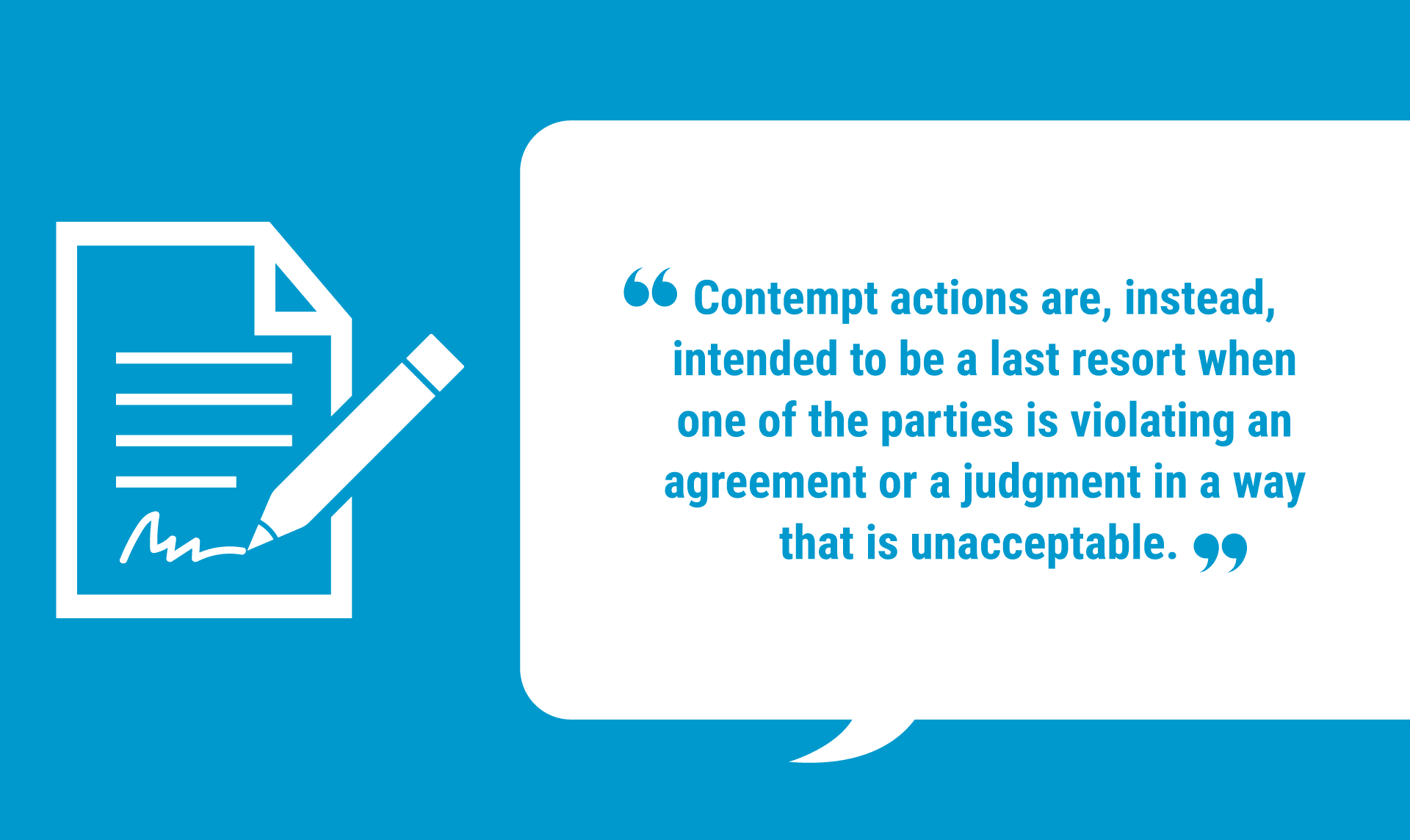
If you and your former spouse and/or your child’s other parent have an agreement that was entered in the Court or a judgment ordered by the Court that governs your obligations and rights as to one another, this agreement or Contempt actions are intended to be a last resort when one of the parties is violating an agreement or a judgment in a way that is objectively unacceptable, such as putting his or her children’s health and well‐being at risk or failing to pay spousal or child support.
This means that if one party or the other fails to abide by the terms of the agreement or judgment, the other party can ask the Court to force that party to abide, or to punish that party for his or her failure to abide. The means for seeking this form of relief from the Court is an action for Contempt.
As with Complaints for Modification, Complaints for Contempt are not intended to be used to be vengeful, or to bring petty disputes before the Court. Contempt actions are, instead, intended to be a last resort when one of the parties is violating an agreement or a judgment in a way that is unacceptable.
Examples would include the failure to pay child or spousal support, one parent obstructing the other’s right to spend time with or communicate with their child, or one party refusing to sign documents required to transfer the title on a property divided by an agreement or judgment.
If a party is found to be in contempt, the Court may order the party to abide by the agreement or judgment they are violating and order the violating party be fined or jailed for failure to abide by those terms. The Court may also require the violating party to pay the aggrieved party’s attorney’s fees (in whole or in part) as well as the aggrieved party’s court costs.
GENERAL PROCEDURE OF A COURT CASE
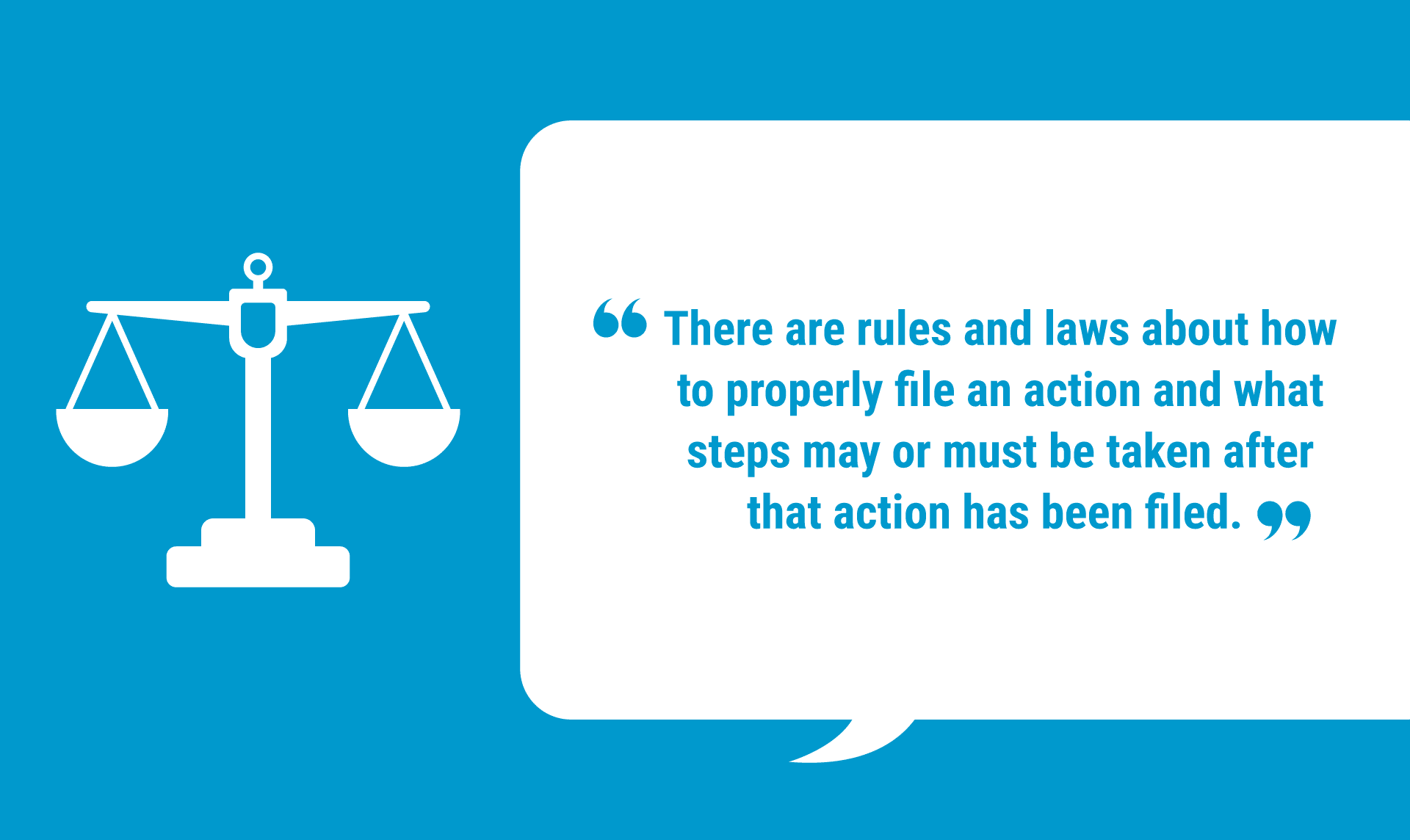
The Probate and Family Courts are courts like any other. There are rules and laws about how to properly file an action and what steps may or must be taken after that action has been filed.
Though the Probate and Family Courts are often more relaxed than other courts in their day‐today operation due to the fact that many parties seeking their help lack legal representation, this does not change the fact that there are important rules governing the procedure of how one litigates.
Whether or not an individual is represented by an attorney, the Probate and Family Courts hold all litigants to the same standards.
STEP 1: FILING A COMPLAINT
The first step in any action in any court is filing a Complaint. A Complaint is a brief statement of what the current problem is and how you would like to see it resolved. If you are filing an uncontested action, the Complaint will be replaced by a Joint Petition that asks the Court to enter a judgment recognizing your agreement.
In cases involving a Complaint, the Complaint must be “served” upon the other party. This means that a sheriff or constable must be paid to hand the other party the documents so that the Court has proof that the other party knows about the proceeding.
The fee owed to the sheriff or constable is among those which are not covered by your fee agreement and must be paid by you.
It is important that you provide your attorney with the correct address and information on when the other party will be home, as the amount charged by the constable depends, in part, on how many attempts he or she must make before successfully serving the other party.
STEP 2: ANSWERS, MOTIONS, TEMPORARY ORDERS AND OTHER APPEARANCES
A Complaint begins the process and tells the Court what your problem is and how you would like to see it resolved. The next step is for the defendant to answer the plaintiff’s complaint. If you are the defendant in the action, you will be served with a copy of the complaint, as well as a summons.
You then have 7 days to provide an answer in the case of a Contempt Action, and 20 days to provide an Answer in all other instances. An Answer is your response to the complaint, affirming or denying the facts that the Plaintiff has alleged and bringing up certain defenses. It may also include a counterclaim where appropriate (essentially, a complaint of your own).
A Complaint is only resolved when the Court has entered a final judgment. This can take some time (see above discussion of track assignments). Often, it is the case that there are immediate Often, it is the case that there are immediate issues that need to be resolved. If this is the case, one party, the other, or both together may ask the Court to enter Temporary Orders.
These orders will lay out the parties’ rights and obligations while the case is open to issues that need to be resolved.
If this is the case, parties can move the Court to enter certain orders. For example, if you have filed a Complaint for Child Custody and Support, you may also file a Motion for Temporary Orders that would outline a temporary parenting plan and child support obligation so that you are not stuck in limbo until your case is resolved months later.
Motions may also be filed to request a number of other things, for instance, the appointment of a Guardian Ad Litem, assistance from the other party with paying your attorney’s fees or to compel compliance with discovery requests (discussed in greater depth below).
It is important to understand that motions must be heard by the Court, so both sides have an opportunity to weigh in on whether or not the motion should be granted, and what the order the Court actually enters should be.
This also means that the opposing party must be given a certain amount of notice prior to a hearing or motion so that they have the opportunity to appear and be heard.
THE FAMILY SERVICE OFFICE
The Probate and Family Courts essentially provide in‐house mediators to parties. On most occasions, if you are appearing before the Court on a contested matter, you will first be sent to the Family Services Office in order to attempt to come to an agreement prior to being heard by the Judge.
We will be with you in the Family Services Office and will negotiate on your behalf during this meeting.
STEP 3: DISCOVERY
Discovery is one of the more intense parts of the legal process, and often, one of the more confusing to those who are not in the legal profession.
The process of discovery is how we formally request and provide information about relevant issues to the other side. There are several different means for requesting information from the other side, some of which are automatic, and some of which are only upon request.
Below, we have provided some basic information on the forms of discovery available in the Probate and Family Courts.
THE FINANCIAL STATEMENT
The Financial Statement is one of the automatic In the Probate and Family Courts, there is certain discovery is mandatory: information that must be provided to the other side simply because a case is pending.
Parties may also choose to pursue other information and documents through making discovery requests.forms of discovery in the Probate and Family Courts. Individuals must honestly and fully complete a Financial Statement anytime there is a financial issue before the Court.
These statements are intended to provide the other side and the Court with a snapshot of your current financial state. It requests information about your income, your expenses, your assets, and any debts you might have.
We cannot stress enough how important being honest on your Financial Statement is, because Intentionally providing false information or withholding information can result in serious penalties for perjury.
SUPPLEMENTAL RULE 410 DISCLOSURES
Another form of “automatic” discovery in the Probate and Family Court, Supplemental Rule 410 provides a list of documents that parties are to provide to one another in order to verify the content of their Financial Statements and present a more complete picture of their financial state.
Certain documents are mandatory in any action involving a financial claim, and others must be presented upon request.
See Appendix A for a checklist of those documents that must be disclosed under Rule 410.
REQUESTS FOR DOCUMENTS
Requests for Documents are a discovery tool used in all civil litigation. This process is not automatic and only occurs if the case actually requires discovery beyond the parties’ Financial Statements and Supplemental Rule 410 disclosures.
Each party has the right to compose a list asking for specific documents that are either relevant and admissible evidence or would tend to lead one to relevant and admissible evidence. Upon receipt of a request for documents, the recipient has 30 days to respond to these requests.
While extensions are routinely granted, a party may be sanctioned by the Court if he or she repeatedly fails to comply.
DEPOSITIONS
Depositions are probably the element of discovery that you are most familiar with, as it is often depicted in the popular media. One party may ask the other party, or a witness, to appear at a certain date and time to verbally answer questions, under oath, and on the record. The party or witness may also be asked to bring certain documents with him or her.
A properly noticed deposition is mandatory, and failure to appear without a valid reason may result in sanctions from the Court. At the deposition, the party taking the deposition will ask questions, which the person being deposed (“the deponent”) must answer.
Both parties and their attorneys are allowed to be present during the deposition, and we recommend that we be present should you be deposed. Depositions are somewhat infrequently used in family law cases but require a fair amount of preparation.
As such, depositions are not included in the original fee you have paid. If the other party seeks to depose you, there will be an additional fee if you would like to be represented during the deposition.
INTERROGATORIES
Interrogatories are yet another form of civil Discovery that is not automatic. In this case, one party may submit to the other a list of questions to be answered. Often, these questions are tied to the Request for Documents.
By way of example, one party may propound an interrogatory asking for a list of all of the bank accounts held by the other party and then ask for documents associated with each of these accounts in his or her request for documents.
STEP 4: PRETRIAL CONFERENCE
If a case has not been settled by a certain point, the Court is required to schedule and the parties are required to attend a Pretrial Conference.
This Conference is not directly before a scheduled trial but is instead intended to be another attempt to get the parties to reach an agreement between themselves. It also gives each party insight into where the other stands, through requiring the submission of a Pretrial Memorandum.
It is worthy of note that most cases settle prior to a Pretrial Conference. In many other cases, the parties reach an agreement at the Pretrial Conference itself.
PRETRIAL MEMORANDUM
A Pretrial Memorandum is a broad overview of the case as it stands. The Memorandum includes sections outlining the cases factual history, its history within the Court, which facts the parties agree about, which each party disputes, and offers some insight into what would occur at a trial.
For instance, a Pretrial Memorandum would include a complete list of any and all witnesses each party believes he or she might want to call should the case go to trial.
STEP 5: TRIAL
Very few family law cases require a trial. There are a variety of reasons for this, but the most important is the nature of the issues. When it comes to one’s family, it is difficult for an outsider (the Judge) to make meaningful decisions about how things should operate.
Often, over the course of the process, both parties realize that they are far better suited to making Very few family law cases require a trial. In most instances, the parties are able to negotiate a full resolution between themselves with the assistance of their attorneys.
If your case should result in a trial, please note that this is an extremely formal process with strict rules governing what may be presented in the Courtroom. Given the large amount of preparation required and the rarity of this event, we do not include trial within the initial fee paid.
At trial, only those issues which have not already been resolved will be the subject of the trial, and once a case has been tried, the decision process is in the hands of the judge.
He or she will take the entire case into account, and arrive at a decision that is mandated by law and equity. This decision may be (and often is) something quite different than anything either party actually wanted.
OTHER CONSIDERATION:
RESTRAINING ORDERS
ABUSE PREVENTION ORDERS
Sometimes, over the course of a family law action, one party will feel it necessary to seek a restraining order against the other. In some cases, such an order is actually necessary. In other cases, a party is stretching the truth or lying because they feel the restraining order gives them Taking out an Abuse Prevention Order against another individual is a serious step that should not be taken lightly.
Those with Abuse Prevention Orders against them are listed in the Commonwealth’s Domestic Violence database permanently and are subject to criminal penalties for violation. Abuse Prevention Orders should not be used as a bargaining chip, but as meaningful protection, if you fear for your physical safety.

At Infinity Law Group, we take the issue of domestic violence seriously and discourage our clients from resorting to such tactics. We do, however, encourage our clients to let us know if the other party is making them feel unsafe, or if they fear they will be physically attacked. Under those circumstances, a restraining order is absolutely appropriate.
So what is a restraining order? Massachusetts allows members of the same household, family members, and those in a romantic relationship to seek Abuse Prevention Orders against one another under certain circumstances (people who are not in one of these relationships may seek a restraining order under a different law). An Abuse Prevention Order is awarded when one person is in reasonable fear that he or she is at imminent risk of serious physical harm at the hands of another person.
These orders can bar a defendant from contacting the plaintiff, from coming to the plaintiff’s home or work, and from using third parties to communicate with or otherwise threaten the plaintiff.
The orders may also require a defendant to surrender any firearms he or she may own, as well as his or her gun license. Lastly, the order may include children and provide a temporary custody solution.
An Abuse Prevention Order may include all or only some of these provisions. It may include exceptions (for instance, that the defendant may not communicate with the plaintiff except for emails regarding the parties’ children).
In any case, the key is to avoid becoming subject to one. In short, do not behave in such a way that can be construed as threatening to the other party, whether by your words or your actions.
Abuse Prevention Orders are recorded in the statewide domestic violence registry, which means being subject to one will turn up on future background checks. It may also reflect poorly on you in proceedings involving your children.
THE AUTOMATIC FINANCIAL RESTRAINING ORDER
When one party or another files a Complaint for Divorce, what is known as a financial restraining order is automatically put into place. This restraining order is intended to prevent parties from making major transfers of assets during the pendency of the divorce.
The underlying purpose is to protect both parties’ interests in these assets. After all, it would be unfair if, for example, one party could simply transfer all of his or her assets into someone else’s, so you must obey the financial restraining order during the pendency of the divorce and thus protect those assets from being divided.
It is important to understand two things: 1) you must obey the financial restraining order, and; 2) the financial restraining order limits only major asset transfers.
This means that during the pendency of the divorce, you can continue to pay bills that you have always paid in the same way you have always paid them, but you can’t, for instance, sell your home or a very valuable piece of property like your car.
Transferring major assets during the pendency of your action reflects poorly on you in the eyes of the Court and can result in you being found to be in contempt.
MOTION TO VACATE THE MARITAL HOME
While most divorces or separations are mutual decisions to end a marriage in which the parties come to an agreement about who will stay in their shared residence and who will leave, from time to time we handle cases where this does not occur. One party decides that he or she can prevent the end of the relationship by refusing to leave the marital home.
In these cases, a motion can be filed requesting that the Court order the other party to leave the marital home and not return for up to 90 days. At the expiration of that time period, the Court may extend the order (and often does).
In order to have a motion to vacate the marital home granted, you must show that your spouse’s presence in the home poses an immediate danger to you or your children’s health, safety, or welfare. The Court does not take removing someone from their home lightly, and it is also helpful to demonstrate that your spouse has someplace else to live while the divorce is resolved.
Please note that this particular remedy is only available to married couples. It is not available to unmarried partners who are living together. If you are unmarried and living with your partner, how to proceed depends on your situation. If you own the property, you may be required to evict the tenant.
If you are co‐tenants in a leased property, or jointly own the property, the Court would be asked to make a decision about who would have temporary exclusive use of the property during the pendency of any action.
THE DOS AND DON’TS OF THE PROCESS
Often, when one is in the midst of a family law issue, they are so overwhelmed that they don’t fully consider their actions.
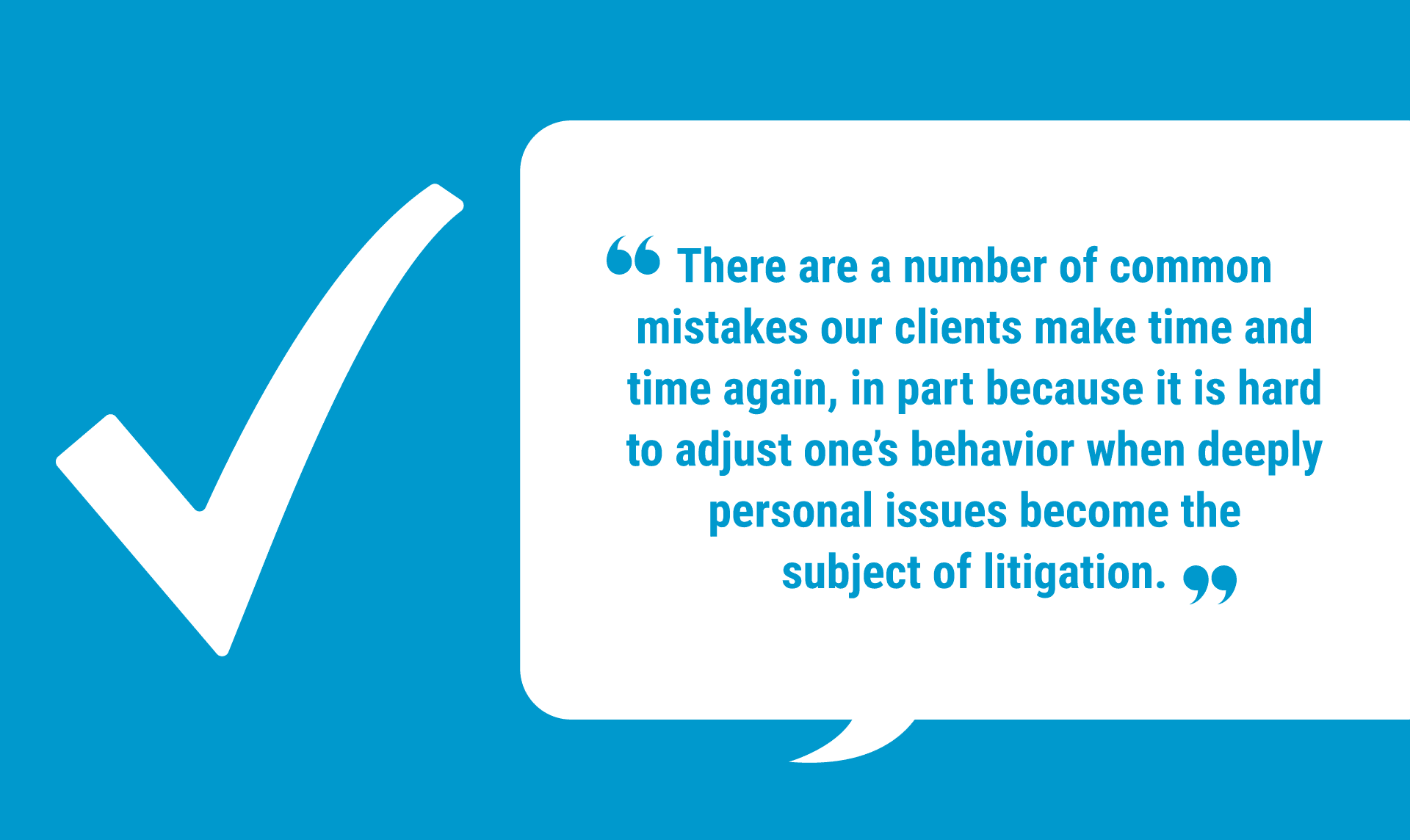
There are a number of common mistakes our clients make time and time again, in part because it is hard to adjust one’s behavior when deeply personal issues become the subject of litigation.
DO
BE OPEN AND HONEST WITH YOUR ATTORNEY
Clients often hide or misrepresent information for fear that we will judge their behavior or disclose information they would like to keep secret.
Often, the failure to be open and honest hurts our client’s case in the long run. Remember, you have hired us to represent your interests.
We can’t accomplish this if we are not prepared for negative things the other side might say. It’s also key to remember that we are bound to keep the information you provide us confidential. We cannot and will not reveal any negative information about you without discussing it as much with you first.
Further, we will not disclose sensitive information about your personal life without first discussing the possibility of such a disclosure with you.
KEEP RECORDS
It is important to maintain records relevant to the claims you are making. This provides specific instances to back up general claims and records of money that you have paid or are owed.
If you are subject to a child support obligation, payments should be made in a traceable form (such as checks or direct deposit) or you should be requesting a receipt.
If your child’s other parent is responsible for assisting with paying uninsured medical expenses, you must have receipts to prove that the payments you are asking for are actually owed.
If your parent’s other child often disobeys the parenting plan, write down the dates, times, and what happened. Keeping track of these issues will enable you to keep track of what is actually going on.
ABIDE BY COURT ORDERS OR INFORM US IF YOU ARE UNABLE TO
If the Court enters orders, you are legally bound to obey them. If you fail to do so, you may be found to be in contempt and the Court may order sanctions, up to and including jail time.
Beyond this, refusing to obey Court orders reflects poorly on you in the eyes of a judge. If you are unable to obey an order, there are procedures for requesting that such an order be modified, but the onus to request such modification is on you.
If you do not request a modification and disobey an order, you have still chosen to flaunt these orders rather than use available processes to change your obligations.
DON’T
DISCLOSE THE CONTENT OF YOUR FEE AGREEMENT, OUR FEE STRUCTURE, OR YOUR FINANCIAL CONCERNS SURROUNDING IT
One of the big mistakes our clients often make is telling the opposing party that they would like to wrap things up quickly because they can’t continue to afford paying our fees.
While we understand why our clients disclose information, what they often forget is that giving this information to the opposing party provides that party with leverage.
You have just told the opposing party that you have a time limit on how long you are willing to fight and sent them the message that you are likely to agree to less favorable terms in order to wrap up the litigation. Even if this is true, you don’t want the other party to know this.
It is our goal to assist you in resolving your family law matter as quickly and fairly as possible. If the other party knows you have a time limit, our negotiating position is weakened and we will have greater difficulty reaching a fair agreement.
PLACE YOUR CHILD IN THE MIDDLE OF THE PROCEEDINGS
This is likely the single biggest “no, no” in any family law case involving children. When reviewing issues of child custody and a parenting plan, the Court is attempting to figure out what is in the best interest of the child. A judge may consider many different things when deciding what is in a child’s best interest, but a factor they always consider is whether or not a parent is capable of making decisions in his or her child’s best interest.
This includes many decisions, not least among them, the ability of a parent to decide whether or not certain conduct or conversation topics are appropriate for their children. The details of litigation involving a child’s parents are never an appropriate conversation topic for that child. A child should not be placed in the middle of the conflict, nor should a parent tell a child negative things about his or her other parent, nor should a parent inform a child of the content of court orders.
This also means that there is no circumstance under which it is appropriate to bring your child with you to Court unless the Court has specifically asked you to bring the child there. Do not, under any circumstance, bring your child with you to Court for any reason!
This action will not garner sympathy, but cause the Court to question whether you, as a parent, are capable of making decisions in the best interest of your child. This does not mean that you and your child’s other parent should not sit down and discuss changes in your family with your child. We absolutely encourage parents to have these difficult conversations with their children.
What we specifically advise our clients against is bringing your child into the center of the conflict with their other parent.
ALLOW YOURSELF TO BE DRAWN INTO NEEDLESS CONFLICT OR ALLOW YOUR TEMPER TO GET THE BEST OF YOU
Family law issues are difficult for all parties involved. Unlike most other areas of law, it is nearly impossible to separate emotion from the issues at hand. No matter what, important relationships in your life are changing.
This is upsetting for even the most stoic among us. We highly recommend that our clients seek the assistance of a professional therapist if they are having difficulty coping with these changes.
It is important that when dealing with the opposing party you allow your most level‐head to prevail. Allowing yourself to be drawn into arguments only serves to further frustrate you, and put you at a further distance from your ultimate goal: to come to an agreement and resolve the matter entirely. It is important to keep this goal in mind.
Allowing yourself to become involved in screaming matches, or to let your temper get the better of you can lead you to say things you might later regret.
Further, such arguments could give the opposing party grounds to seek an Abuse Prevention Order, a consequence that is undesirable generally, but especially while you are in the midst of litigating a family law issue.
VIOLATE ANY COURT ORDER, INCLUDING THE AUTOMATIC FINANCIAL RESTRAINING ORDER
The last thing anyone wants during a case is for the Judge to have a poor opinion of them. One of the easiest ways to make a Judge think poorly of you is to disrespect and disobey Court orders.
This isn’t a matter of ego, but a commonsense assessment: if a party cannot be trusted to obey Court orders, they do not have respect for the legal process, and they are likely to be dishonest. It may not be true in every case, but it can be an excellent indicator.
This being said, it is key to obey all orders of the court. This includes the automatic financial restraining order and any abuse prevention order that the other party may have against you (or anyone else, for that matter).
Obeying court orders, or when impossible, using the appropriate procedures to modify those orders, is an easy way to demonstrate to the Court that you are genuinely interested in working towards a solution to your issue.
Divorce Process FAQs
Can I file for divorce in Boston if I just moved here?
You can file for divorce in Massachusetts if 1) you and your spouse previously lived here together, and one of you lives here at the time of the divorce, 2) you have lived in Massachusetts at least one year before filing for divorce, or 3) you lived in Massachusetts and the reason for the divorce occurred while living here. But you can’t move to Massachusetts for the purpose of getting a divorce here. If you meet the residency requirement, you’ll typically file in the county where you live.
Do I have to give the court a reason for my divorce?
Yes, but that reason doesn’t have to be that someone did something wrong. Your reason could be the irretrievable breakdown of the marriage. It’s known as a no-fault divorce. There also are other causes for divorce, such as addiction, adultery, abuse, or desertion, but it’s rare to file for a fault-based divorce. You’ll only file a fault-based divorce if it would provide some legal advantage.
Do we have to go to court to get a divorce?
Yes and no. A divorce is a legal process that requires filing paperwork with the court and appearing in court a few times. But a divorce does not mean you have to go through a trial or several hearings. Spouses are encouraged to resolve their issues outside of the courtroom and develop a written agreement without judicial intervention. You can negotiate with your spouse privately or use mediation to reach a divorce settlement. Any divorce will require at least 1 hearing in front of a judge, but if everything is agreed upon, the hearing will be quick and painless.
When is my divorce official?
Massachusetts has what’s called the NISI Period, which is the time between when the court issues the final divorce Judgment and when that Judgment takes effect. If you went through an uncontested divorce, you are officially divorced 120 days after the final hearing in front of a judge. If you went through a contested divorce, you are officially divorced 90 days after the last hearing in front of a judge or the judge issues a judgment. Once the NISI period is over, you can file your taxes as single and get remarried.
What should I do if I’m worried about my safety?
If your spouse has been violent to your or the children, or you are worried they might become violent, call a divorce attorney immediately. There are options to help keep you safe, including a domestic violence restraining order and an order to vacate the marital home. We also can help you pursue sole physical custody of your children if they are in danger.
Contact Our Team of Massachusetts Divorce Law Experts for More Information
We hope that this page has served you well in better informing you about Massachusetts divorce proceedings, but of course, we understand that your relevant legal advice particularly pertains to your unique situation.
Contact us today for a free consultation so we can review the details of your separation agreement and help you formulate the very best legal strategies for your divorce.
 Infinity Law Group LLC
Infinity Law Group LLC





